- Home
- Hammond Innes
North Star
North Star Read online
Contents
Cover
About the Book
About the Author
Also by Hammond Innes
Map
Dedication
Title Page
Epigraph
I – The Trawler
One
Two
Three
Four
II – The Rig
One
Two
Three
Four
III – Storm
One
Two
Three
Four
Author’s Note
Copyright
About the Book
Michael Randall flees to the wild seas around the Shetlands to escape an impossible dilemma. There he finds a North Sea oil rig, and the unlikely possibility of a new life. But one stormy night, this glimmer of hope for the future, and Randall’s life itself, is thrown into jeopardy.
About the Author
Ralph Hammond Innes was born in Horsham, Sussex, on 15 July 1913 and educated at Cranbrook School, Kent. He left school aged eighteen, and worked successively in publishing, teaching and journalism. In 1936, in need of money in order to marry, he wrote a supernatural thriller, The Doppelganger, which was published in 1937 as part of a two-year, four book deal. In 1939 Innes moved to a different publisher, and began to write compulsively, continuing to publish throughout his service in the Royal Artillery during the Second World War.
Innes travelled widely to research his novels and always wrote from personal experience – his 1940s novels The Blue Ice and The White South were informed by time spent working on a whaling ship in the Antarctic, while The Lonely Skier came out of a post-war skiing course in the Dolomites. He was a keen and accomplished sailor, which passion inspired his 1956 bestseller The Wreck of the Mary Deare. The equally successful 1959 film adaptation of this novel enabled Innes to buy a large yacht, the Mary Deare, in which he sailed around the world for the next fifteen years, accompanied by his wife and fellow author Dorothy Lang.
Innes wrote over thirty novels, as well as several works of non-fiction and travel journalism. His thrilling stories of spies, counterfeiters, black markets and shipwreck earned him both literary acclaim and an international following, and in 1978 he was awarded a CBE. Hammond Innes died at his home in Suffolk on 10th June 1998.
OTHER NOVELS BY HAMMOND INNES
Air Bridge
Attack Alarm
Atlantic Fury
Campbell’s Kingdom
Dead and Alive
Delta Connection
Golden Soak
High Stand
Isvik
Killer Mine
Levkas Man
Maddon’s Rock
Medusa
Solomons Seal
Target Antarctica
The Angry Mountain
The Big Footprints
The Black Tide
The Blue Ice
The Doomed Oasis
The Land God Gave to Cain
The Last Voyage
The Lonely Skier
The Strange Land
The Strode Venturer
The Trojan Horse
The White South
The Wreck of the Mary Deare
Wreckers Must Breathe
For
Nora and Jim
whose assistance was invaluable
HAMMOND INNES
North Star
No, when the fight begins within himself,
A man’s worth something.
– Browning
I
THE TRAWLER
1
It was March, the wind cold from the north-east and the Fisher Maid plunging down the waves with a wicked twist to her tail. I shut the door of the bridge behind me, leaving the skipper to listen to the forecast, and went down the ladder, heading aft to check the gear. I knew the forecast would be bad. But it couldn’t be any worse than the weather we had had off Bear Island. I paused in the shelter of the superstructure. Here on the starboard side I was out of the wind and I took out my pipe, filling it automatically, standing there, staring out across the darkening sea.
I had seen to the stowage of the gear myself, a thousand miles back when we had finished trawling; it was just an excuse to be out in the open, away from the smell of oil and stale food, the blare of the radio and the company of men I had been locked up with for too long. On a trawler it’s bloody difficult to be alone when you want to.
Shetland was still just visible, the black humps of the distant hills like wave patterns against a cold green strip of sky, and the light on Sumburgh Head blinking above the hard line of the horizon. Only that pale green strip to mark the bitter cold we’d been steaming through; the rest of the sky was clouded over now. A flurry of sleet drove like a veil across the starboard navigation light. Inside of two days we would be back in Hull, and still I hadn’t made up my mind, the shadowy figures, the crash of glass, the sudden blaze of bottled petrol, and that child’s face at the upstairs window … It had haunted me throughout the voyage.
Slowly the pale light faded in the west. I stood there watching it until that last vestige of the dying day was engulfed by night, wondering whether the strike would still be on, what the hell I was going to do. Waves were breaking against the stem, the driven spume white in the gathering dark, and the wind whistling in the top hamper. I was thinking of my father then, wondering what he would have done, giving his life for a cause in a country not his own. Would he have allowed his principles to be totally destroyed by a single cruel and senseless action?
The match made a small flared arc as I tossed it over the side, my hands gripping the rail, the metal cold to the touch, my eyes staring westward to Shetland, fifteen miles away. He had been born in Shetland, and I had never been there. I hadn’t even known him, only the legend. My mind slipped back, my life in flashes, and always that legend, a guiding light to everything I had done – and I wasn’t sure any more. A door opened, the muffled sound of the radio reminding me of the industrial world just two days’ steaming away, the docks, the stuffy smoky meetings, the arguments, the pickets, the turmoil of over-population, man in the mass. Christ! How could one man, one individual speck, find his way in the tangle of motives and pressures?
‘Mike!’
I turned, glancing upwards to see Sparks standing at the top of the ladder, his thin hair blowing in the wind. The bridge door slammed behind him as he came down to stand beside me, a sheet of paper thrust towards me.
I pushed it away. ‘I don’t need a forecast to tell me it’ll be Force 9 before the night’s out.’
‘It’s not the forecast.’ His thin, rather high-pitched voice was half blown away by the wind. ‘A message for the skipper.’
‘Well, give it to him then,’ I said irritably.
‘I have. But since it concerns you –’ I could smell the beer on his breath as his pale face thrust closer, the eyes bright behind his glasses. ‘You in trouble?’
‘How d’you mean?’
‘Look, Mike,’ he said, ‘you were shipped at the last minute after Les Sinclair had gone down with a virus. You and the skipper – you’re not buddies like Les, so he may not tell you. I thought I’d warn you, that’s all. The police will be waiting for you when we dock. A Detective-Sergeant Wright. Here’s a copy of the message.’ And he pressed the piece of paper into my hands.
‘Thanks.’
‘They want to interview you. I suppose you know why?’
‘Yes, I know why.’ I stuffed the paper into my pocket, staring out into the night, saying nothing. I had been afraid of this all through the voyage. Somebody must have recognized me, and now, when I stepped ashore, the police would be there, wanting a statement. And if I gave
it to them, if I admitted I knew who the men were, then I would be a witness for the prosecution, and the decision would no longer be a personal one, something between me and my conscience and made of my own volition. It would be the result of police interrogation. At least it would seem like that to everybody but me.
‘D’you want any sort of a message sent, a private message – lawyers or anything like that?’ He was still standing there at my elbow, a man whose world was the ether, who fed on information dragged out of the air on invisible wavelengths, his curiosity glowing in his owlish eyes.
‘No,’ I said. ‘There’s nothing a lawyer can do.’
He hesitated, standing there beside me, waiting. Doubtless it was kind of him, but radio operators are all the same. They want to be in everybody’s confidence. In the end he left me and I was alone again, watching as the ice-battered trawler plunged southward down the North Sea, each surge and twist carrying me closer to the moment of decision. But you don’t change the whole direction of your life because a child is nearly burned alive. Or do you?
The storm was rising, and in the end I gave up thinking about it and went to my cabin, lying there, sleepless and fully clothed, the ship’s plates writhing to the violence of the movement. I was back on the bridge in time to get the news. It came right at the end, the talks broken off and the strike still on. Weeks now and every shipyard in Hull at a standstill. Did that mean Pierson and Watt were out, too?
The skipper was there and he turned and looked at me. ‘You hear that? And the poomps going full bat.’
They’d been going flat out ever since we’d hit the ice. ‘They’ll get us home,’ I said.
He didn’t answer, moving to the port side of the bridge, his carpet slippers flapping loosely. He wasn’t a big man, but there was a lot of strength in that short, long-armed body, the round bullet head almost neckless on broad shoulders. And he had an inner strength, his silences more telling than words. He stood there for a while, staring out into the murk ahead. ‘Better get some sleep. It’s going to be a long night.’
I nodded. It was his watch now and I went below, checking the engine-room and the hold. The fish pounds were just about full, almost two thousand kit – that would be about 20,000 stone landed, a lot of it high-priced. Worth the bashing we had taken up there on the edge of the pack and my share as mate looking good. The fact that she was low in the water did not matter now. We were running with a quartering sea and the pumps were holding. If we’d been steaming into it things might have been different.
It was a long night all right. At four in the morning I was back on the bridge, visibility almost nil and the big deckie they called the Porpoise with his eyes glued to the radar screen. The skipper was in the chartroom working out a Decca position. His thick hairy hands juggled with the parallel rule, pencilling a cross just east of our intended course. ‘Wind’s veered a point, pooshing us more than I thought.’ He ordered a correction to the helm as he entered up the log, and then, instead of leaving me to my watch, he slid the chartroom door shut. ‘Three weeks now. You heard what they said on the news. Every yard in Hooll at a standstill.’ He had his broad bottom wedged against the chart table, his slightly protuberant eyes fixed on me. ‘Every blasted yard.’ He pulled his pipe out and began to fill it. ‘When did you first go into trawling?’
‘Some years back now.’
‘Ah asked when.’
‘Spring of 1969 – the Lady Betty.’
‘Old Harcourt. Shipped as a deckie, did you?’
I nodded.
‘And your mate’s ticket four years later.’ He lit his pipe, solid and immovable as the ship fell off a wavetop, sending the rule and dividers skidding across the chart. ‘Ah doan’t understand you, and that’s the truth. A bloke with your education –’ He shook his head, frowning. ‘Still got your union card an’all?’
‘Yes.’
‘But not the Hooll Trawlers’ Officers – shipyard, isn’t it?’
I didn’t say anything and he grunted. ‘What made you switch to trawling?’
‘My own business,’ I said.
‘Aye.’ He took the pipe out of his mouth, his eyes staring. ‘But just tell me. Ah’d laike t’knaw.’
I laughed. What could I tell him? ‘The sea,’ I said. ‘It’s in my blood, I suppose.’
‘You were at the Marston Yard on Clydebank, a member of the strike committee in 1968. And before that you were in prison, result of a demo that tangled with the police.’
‘That’s a long time ago.’
‘You’re still the same bloke, aren’t you?’
‘Come to the point,’ I said.
‘Orl raight, Ah will. Pierson & Watt now, if they’ve coom oot … Sounds laike it, an’ they’re non-union, all of them. Young Watt won’t employ union men. So where do we go for a refit?’
‘Not my problem,’ I said.
‘No. Not your problem. But you’re doing, I reck’n.’
‘Then you’re wrong.’
He shook his head, an obstinate look on his face. ‘You’re a good mate. I grant you that. But you’re a trouble-maker. I wouldn’t have shipped you if –’ He stuffed his pipe firmly back into his mouth.
‘If what?’ I asked.
‘I was doing you a favour.’
‘You were short of a mate.’
‘Aye. But it didn’t have to be you.’ And then he shrugged and said, ‘Orl raiglit, Ah’ll tell you – Jimmy Watt asked me to take you. Get the bugger off our backs, that’s how he put it.’ And then his big forefinger was jabbing me in the chest. ‘Do you deny you were on the Committee?’
‘Not on the Committee. I was called in to advise them.’
‘Advise them, eh?’ His voice was still quiet and under control, but the Hull accent was stronger now, something building up in him, an undercurrent of menace. ‘Advise them on what? Intimidation?’ He leaned his round head closer, the grey eyes cold and fishlike in the hard light. ‘Or did they call you in to get at Jimmy’s foreman, to get Bob Entwisle to –’
‘What the hell are you talking about?’ I was suddenly angry, remembering how I’d walked out of that crowded meeting, the little Congregational Hall thick with smoke and full of violence. ‘You know nothing about it.’
‘Doan’t I? Well I know this –’
‘You listen to me.’ I was shouting and I reached out and grabbed hold of his shoulder.
‘Doan’t you dare.’ He slammed his big fists down on my arms, wrenching himself free. ‘Keep your hands off.’
‘Just listen,’ I said. ‘It was the economics of the strike – the future of the yards, the financial state of shipbuilding in the North East. They were scared about their jobs.’
He glared at me. ‘They doan’t care about their jobs. They doan’t care about anything – just so long as they can smash us all to hell.’
‘You may be right.’ What was the point of arguing with him? I suddenly felt tired. ‘My watch,’ I said. ‘You’d better get some sleep yourself now.’
‘Why would they ask you about the financial state of the shipbuilding industry?’
‘I was trained as an economist. London School of Economics. You know so much about me you should know that.’ I turned to the chart. ‘What do you intend to do? You can’t make another trip without a refit. There’s a leak for’ard where we hit that growler –’
‘Ah doan’t need you to tell me that.’ He relit his pipe, staring down at the chart. ‘There’s no roosh. Ah’ll have a word with Jimmy in the morning. Aye.’ He nodded to himself. ‘We’ve a little time yet.’ And he turned abruptly, without another word, and left me alone to my watch.
It was a long four hours; nothing to relieve the monotony but the slowly changing position of an oil rig seen only as a blip on the radar screen. The wind was gusting 50 knots, the ship standing on her head and no visibility in the blinding murk of sleet and spray. Plenty of time to think, and my brain too tired, too numbed by the battering to work out what I was going to tell the police when we docke
d. There had been two of them, two shadowy figures, and then the crash of glass, the sudden blaze, their faces lit as they turned and ran.
I switched on the Decca Navigator, concentrating on the clicking dials to get a fix, doing it automatically, knowing I could identify them both and worrying about Bucknall Claxby I didn’t care about; he was an older man, a hardline militant brought in to cause trouble. If it had been just Claxby, there on his own, I wouldn’t have hesitated. But young Harry Bucknall was the son of a good honest shipyard worker who had marched to London with the Jarrow boys in the thirties. A post-graduate university student, intelligent and an anarchist. At least he had done it out of conviction, believing that violence was the path to revolution. And I had no doubt who had been the ringleader.
I entered up the fix and went back to stand by the wheel, staring out into the black night. All I had to do was tell the police. Tell them the truth. But it was the charge that worried me. If I hadn’t been there, if the little girl had died in that fire, it would have been murder. The charge could still be attempted murder and myself in the witness box, the full glare of publicity, and everybody knowing I had been interrogated by the police. It would be my evidence, my evidence alone, that convicted them. I would be cast in the role of a Judas. And they hadn’t meant to harm the little girl. They hadn’t known she was there.
All this time I was pacing up and down, the bridge tumbling under my feet, the noise of the storm beating at my ears, the elements in tune with my mood – everything in chaos, the world, my life, everything. Was this a sort of crossroads in the long journey from womb to grave? If only there were somebody I could turn to, somebody to lean on, to give me strength, to tell me what the hell to do.
I was thinking of Fiona then, wishing to God that just something in my life had turned out right. And then a rogue wave came out of the night, hitting us on the quarter, water roaring along the port side, and as the ship fell off the top of it with a slam that hurled me against the man at the wheel I heard him cursing under his breath. Our eyes met and his big mouth opened in a grin: ‘Them lads ashore … all toocked oop in bed with their womenfolk. Makes me laff on a night like this.’

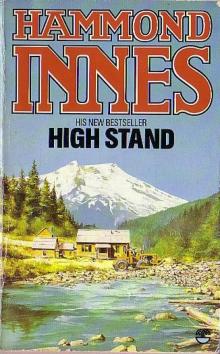 High Stand
High Stand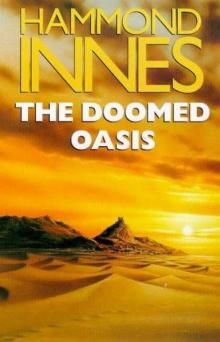 The Doomed Oasis
The Doomed Oasis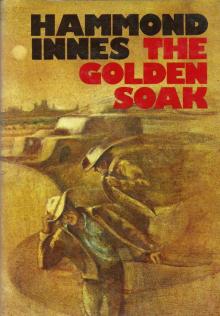 Golden Soak
Golden Soak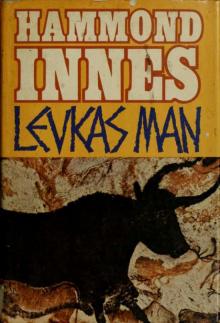 Levkas Man (Mystery)
Levkas Man (Mystery)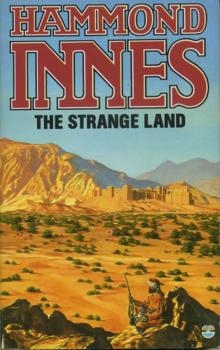 The Strange Land
The Strange Land Dead and Alive
Dead and Alive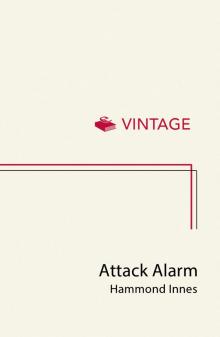 Attack Alarm
Attack Alarm The Strode Venturer
The Strode Venturer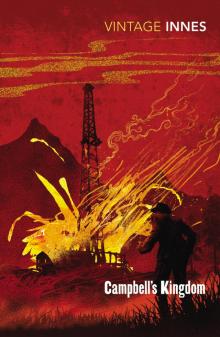 Campbell's Kingdom
Campbell's Kingdom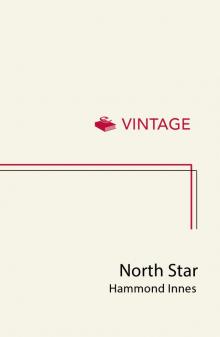 North Star
North Star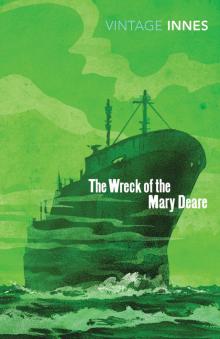 The Wreck of the Mary Deare
The Wreck of the Mary Deare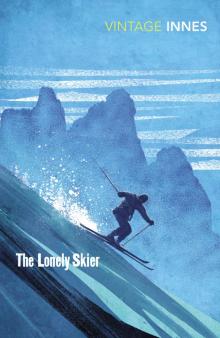 The Lonely Skier
The Lonely Skier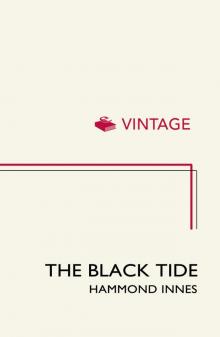 The Black Tide
The Black Tide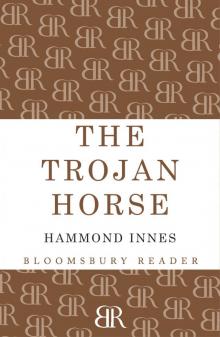 The Trojan Horse
The Trojan Horse Medusa
Medusa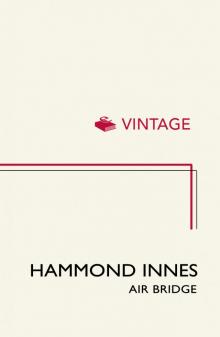 Air Bridge
Air Bridge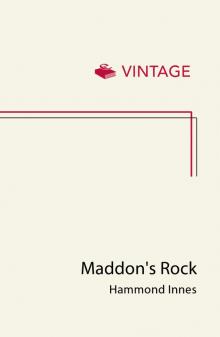 Maddon's Rock
Maddon's Rock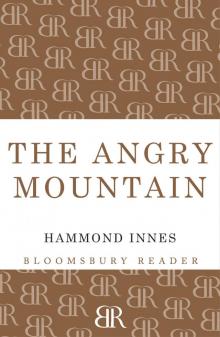 The Angry Mountain
The Angry Mountain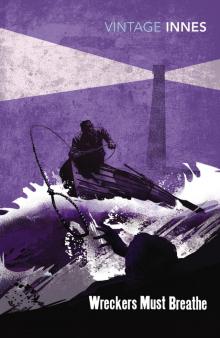 Wreckers Must Breathe
Wreckers Must Breathe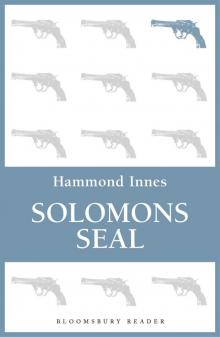 Solomons Seal
Solomons Seal The White South
The White South